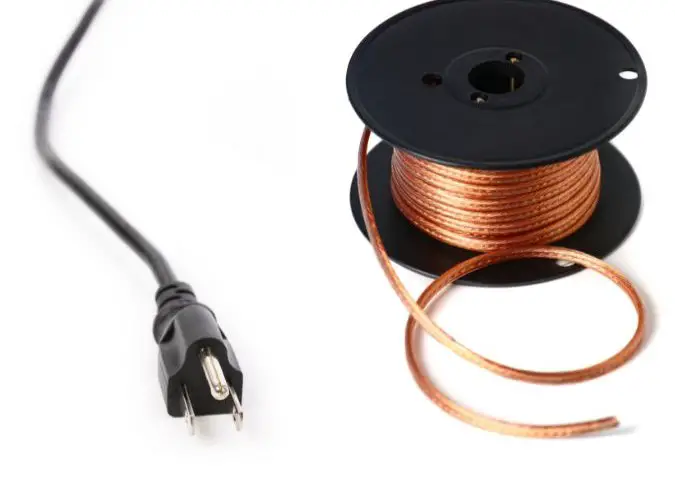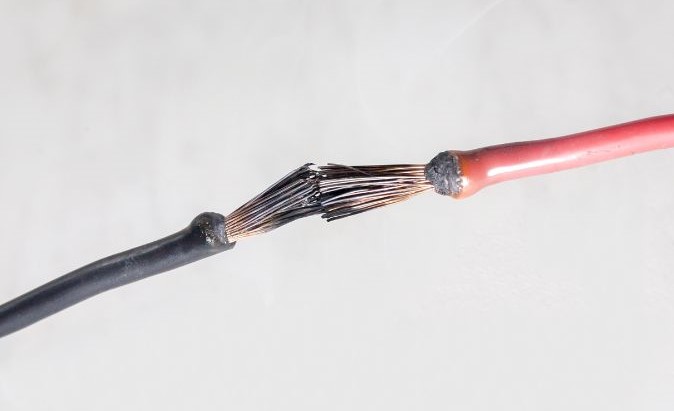Fear of harm or damage is actually a significant hurdle that stops many people from getting into the world of audio. When some people learn that most high end speakers need to be connected with speaker wire, they think electricity, shocks, fires, and get the heebie-jeebies.
It’s perfectly understandable that the idea of electrically wiring anything might make someone nervous, but how dangerous can speaker wire actually be?
Does Speaker Wire Carry Actual Electricity?
When people think of flowing electricity, they’ll typically picture a regular cable coming out of an appliance that’s plugged into a wall socket, but speaker wire doesn’t connect to an electrical outlet, and it looks different than a typical wire and two or three pronged plug does.

So does electricity actually flow through speaker wire? The answer is yes. Electricity will come from an amplifier – which is plugged into a socket – flow through the connected speaker wire, and is what causes the magnet and woofer inside a speaker to move and create sound.
That said, the actual amount of electricity is typically much, much less than the amount that flows out of a standard wall socket – so little in fact that odds of it being actually dangerous are very slim.
Does Speaker Wire Have Voltage?
Yes, live speaker wire that’s supplying power to speaker will have voltage. That’s because any medium that has electricity flowing through it has voltage by definition. Some people think that voltage is just another word for electricity and that the two concepts are interchangeable, but that’s not technically accurate.
Voltage, in basic terms, is the difference in electrical “pressure” between two points. So, a passive speaker terminal, which has zero electrical power, that’s connected to a power amplifier, which obviously has more than zero electrical power, will have a pressure difference that forces electricity to move from the amplifier to the speaker.
Fundamentally, electricity behaves similarly to how water behaves, and thinking about a water system is a good way to intuit the concept of voltage: if you have one container with higher water pressure than another, and they get connected with a pipe, then water will get pushed through the pipe from the higher pressure container into the lower pressure container. The difference in pressure in the two containers is, in a way, the “voltage” of the water.
Can Live Speaker Wire Shock You If You Accidentally Touch It?
It is technically possible for a live speaker wire with electricity flowing through it to shock you. But, the odds of it being significant enough to be painful or harmful, or for you to even feel it in fact, is slim. That’s because the amount of power that’s needed to make a speaker work, and that thus flows through speaker wire, is actually quite small.
A single channel of a residential grade receiver or amplifier will rarely put out, at a maximum, more than 100 watts, and on average it will only output a small fraction of that. For context, that’s about 20-50 times less watts than a standard United States wall socket is rated for.
And that’s assuming you straight up touch a live speaker wire that’s not connected to anything at all, when in reality a live wire you might accidentally touch is probably already connected to a speaker. Electricity, like water once again, follows the path of least resistance – so, the electricity is far more likely to simply continue along the highly conductive and low resistance speaker components rather than into your skin, which has much higher electrical resistance.
Now, if someone cranked up the volume on a 1000 plus watt amp and grabbed bare wires coming from all channels at once, yea they might get a bit of a jolt, but for the vast majority of us that aren’t a cast member of Jackass, nothing like that will ever happen.
What Happens if a Positive and Negative Speaker Wire Accidentally Touch?

If a live positive and negative speaker wire do manage to accidentally touch, it will create what’s called a short circuit, which in this case basically means electricity will flow from the positive terminal of the amplifier right back into the negative terminal of the amplifier and skip the speaker.
Accidentally touching speaker wires is a fear that a lot of people have when you’re dealing with positive and negative connection terminals on receivers and speakers that are right next to each other. But what will actually happen if this mistake is made?
The answer is probably nothing dangerous or significant, and the main reason why is that just about every modern amplifier has built-in detection for short circuits. If an amplifier suddenly receives an unusually large amount of current it will immediately enter “protect” or “limiting” mode and basically stop the current from flowing all together. If there is music or other media actually playing when the short circuit happens, all that will likely happen is that the speakers go silent. You might hear a briefly unpleasant sound that is caused by the speakers clipping, which is something that happens when a speaker receives too little power.
Once the short circuit is removed, the amplifier should automatically come out of protect or limiting mode and resume functioning normally.
Can Speaker Wire Cause a Fire?
While it’s theoretically possible, this is also extremely unlikely, mainly because as we’ve said the actual amount of electricity that flows through speaker wire is very little, and not nearly enough on its own to create enough heat to ignite something, which would further imply that something flammable also happened to be next to the exposed speaker wire.
Think about how rare fires are as a result of household appliances being plugged in properly. Now if you consider that speaker wire will rarely have more than a small fraction of that amount of power, you can see how unlikely it is for it to start a fire.
Something worth noting here: if you decide to run speaker wire through the wall, which often done when connecting outdoor speakers to a receiver inside for example. Through-wall runs requires specialized speaker wire that’s CL2/CL3 certified, which means it has the proper additional insulation to prevent in-wall fires from starting.
A Key Takeaway Here
If there’s one piece of advice to be gleaned here it’s this: don’t fiddle with speaker wire if the components are turned on and especially if media is playing. As long as you always turn everything off before switching or moving anything around, and you also connect things properly per the user manuals of your various components, the odds of something dangerous or damaging happening with speaker wire is very unlikely.
